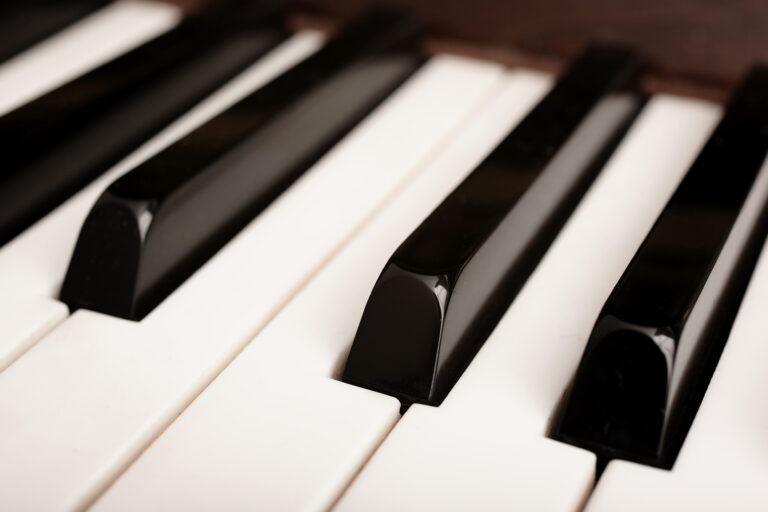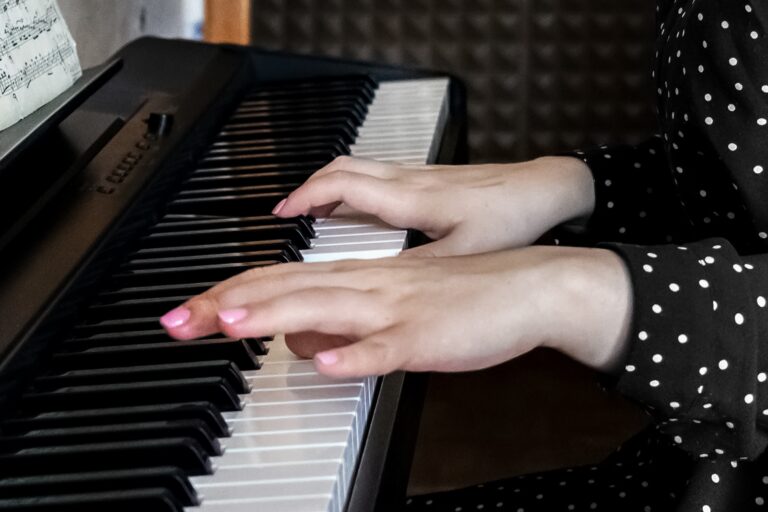Advanced Piano Techniques | Exploring Arpeggios, Scales, and More
Congratulations! You’ve traversed the initial hurdles of piano playing and are now venturing into the exciting realm of advanced techniques. This is where your musical journey truly takes flight as you unlock a world of expressive possibilities. But with this new territory comes the challenge of mastering advanced techniques that enhance your playing and elevate your musicality.
This guide delves into two fundamental yet powerful techniques: arpeggios and scales. While they may seem familiar from your beginner days, at the advanced level, they become building blocks for improvisation, voicing chords, and navigating complex passages with fluidity and precision.
Arpeggios | Unveiling the Chords Within

An arpeggio is a broken chord, its notes played individually in a specific sequence. Mastering arpeggios unlocks a treasure trove of benefits for advanced pianists:
- Harmonic Understanding: Arpeggios expose the inner workings of chords. As you practice various arpeggio voicings, you gain a deeper understanding of how chords are constructed and how they interact with each other. This knowledge becomes crucial for improvisation and voicing chords in your own musical creations.
- Finger Independence and Agility: Playing arpeggios smoothly and evenly requires exceptional finger independence and agility. Dedicated practice improves your dexterity, allowing you to tackle intricate passages with confidence.
- Voicing Chords with Style: Arpeggios offer a dynamic way to voice chords. By practicing different arpeggio voicings – playing the notes in different orders – you’ expand your harmonic vocabulary and create richer, more interesting chord progressions.
Scales | Building Blocks for Virtuosity

Scales are the foundation of all music, and mastering them at an advanced level is crucial for any serious pianist. Here’s why:
- Technical Development: Scales provide a comprehensive workout for your fingers. Practicing scales in various keys, tempos, and articulations builds finger strength, stamina, and overall technical facility. This allows you to play complex passages with confidence and control.
- Improvisation and Soloing: Scales form the basis for improvisation and soloing. By internalizing various scales and their patterns, you’ll be able to navigate chord progressions and create expressive melodies spontaneously.
- Sight-Reading Proficiency: Scale fluency translates to improved sight-reading skills. Being comfortable with scales in different keys allows you to decipher and play unfamiliar passages with greater ease.
Scaling the Heights | Advanced Practice Techniques

Having a solid foundation in scales is essential, but advanced pianists can take their practice to the next level:
- Double Scales: Challenge yourself by practicing scales in double notes. This means playing two notes simultaneously with each hand, pushing your coordination and technical skills to new heights.
- Arpeggiated Scales: Combine arpeggios and scales by practicing arpeggiated scales. This technique involves playing the notes of a scale in an arpeggio pattern, further enhancing your finger independence and harmonic understanding.
- Chromatic Scales: Mastering chromatic scales, which involve all twelve semitones within an octave, unlocks a world of possibilities. They are essential for playing advanced repertoire with complex modulations and atonal passages.
Beyond the Basics | Advanced Applications of Arpeggios and Scales

Arpeggios and scales aren’t just isolated exercises. They are the building blocks for a myriad of advanced piano techniques:
- Improvisation: Armed with a deep understanding of arpeggios and scales, you can use them as a springboard for improvisation. By weaving scales and arpeggios around chord progressions, you can create expressive solos and spontaneous melodies.
- Voicing Chords: Don’t just play block chords (all notes played together). Explore different voicings using arpeggios. This adds depth and texture to your playing and creates a more professional sound.
- Ornamentation: Advanced pianists utilize ornaments like trills, turns, and grace notes to add flair and expression to their playing. Scales and arpeggios form the foundation for mastering these ornaments. By practicing scales and arpeggios with ornaments, you develop the dexterity and control needed to execute them flawlessly.
- Double-Handed Techniques: Many advanced piano pieces demand sophisticated double-handed techniques like contrary motion (one hand playing a scale upwards while the other plays downwards) and independent voices (each hand playing a different melodic line). Mastering scales and arpeggios with both hands independently equips you to tackle these challenges with confidence.
Technology as Your Practice Partner

The digital age offers a wealth of tools to enhance your advanced piano practice:
- Metronomes and Backing Tracks: Utilize a metronome to practice scales and arpeggios at various tempos, ensuring rhythmic accuracy. Explore backing tracks that provide harmonic context for your arpeggio and scale practice, simulating the experience of playing with a band or orchestra.
- Learning Apps: Several advanced piano learning apps offer interactive exercises and challenges specifically designed to improve your scale and arpeggio playing. These apps can provide a fun and engaging way to supplement your practice routine.
- Online Masterclasses: Immerse yourself in the wisdom of renowned pianists by attending online masterclasses. Observe how these masters approach scales and arpeggios, glean valuable techniques and insights, and gain inspiration for your own practice.
The Journey Continues | Embrace the Challenge
Mastering advanced piano techniques is a continuous journey. Embrace the challenges, celebrate your progress, and most importantly, enjoy the process of honing your musical craft. As you delve deeper into the world of arpeggios, scales, and their applications, you’ll unlock new levels of expression, technical prowess, and overall musicality.
Remember
- Consistency is Key: Regular practice, even for short periods, is far more effective than sporadic marathon sessions.
- Focus on Quality Over Quantity: Prioritize mindful practice, ensuring each repetition is accurate and controlled.
- Seek Guidance: Consider working with a qualified piano teacher who can provide personalized feedback and guidance on your advanced technique development.
With dedication and a strategic approach, you’ll conquer the intricacies of advanced piano techniques and embark on a truly fulfilling musical journey. So, keep practicing, keep exploring, and let the music flow!
For more information and exciting resources about learning music, visit our website at The Mystic Keys. For more music content and exciting offers follow us on








